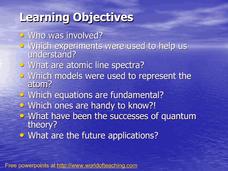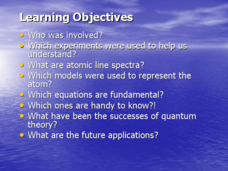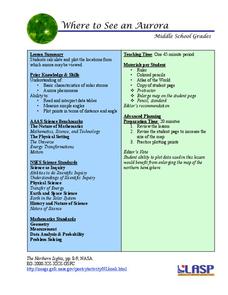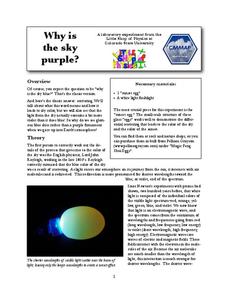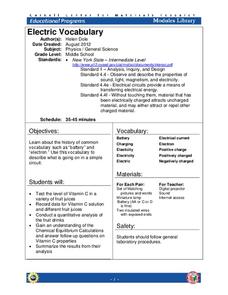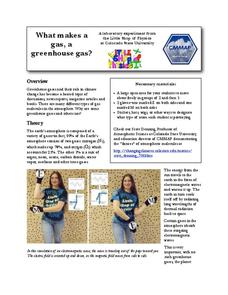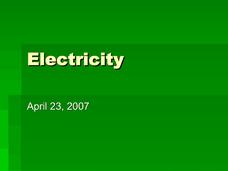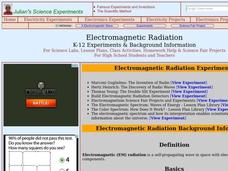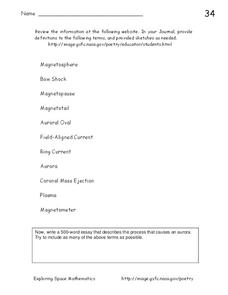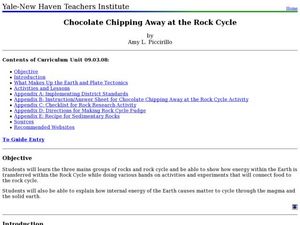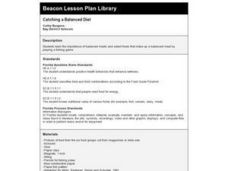Science Geek
Electrons in Atoms
Electrons could never be Bohring! The presentation covers where you find electrons in an atom. It begins with the Bohr Model, then moves on to the Heisenberg Principle and orbital shapes. It concludes with the concept of electron spin...
Virginia Department of Education
Isotopes
Lead your class through the amazing world of isotopes as they investigate the various properties they contain and further understand their respective location on the periodic table. They explore half-lives and radioactivity as each...
Cornell University
Glued into Science—Classifying Polymers
Explore the unique characteristics of polymers. A complete lesson plan begins with a presentation introducing polymers. Following the presentation, young scientists develop a laboratory plan for creating substances using polymers. They...
Curated OER
Quantum Mechanics
Mostly what you will find here is a history of quantum mechanics. Influential scientists are introduced (along with some of their recorded quotes), the progression of atomic models is reviewed, and finally experssions and equations are...
Curated OER
The Who's Who of Quantum Physics
This wonderful recap of powerful figures in scientific history includes pictures, important dates, and the information about their inventions or impact. Atomic structure and the photoelectric effect are introduced. The first slide gives...
Curated OER
Electrical Principals and Wiring Materials
Train a budding electrician about the principles of electricity and the wiring materials needed to complete the job. Briefly covered are basic electrical concepts such as, volts, watts, circuits, and safety. Also covered are the...
PHET
Where to See an Aurora
Where can you see an aurora in North America? After completing an astronomy activity, scholars can locate the exact coordinates. Pupils plot points of the inner and outer ring of the auroral oval and answer questions based on their...
Colorado State University
Why Is the Sky Purple?
The color of the sky depends on the time of day. Young scholars experiment with scattering different wavelengths of light to recreate the color of the sky. They observe both the longer blue wavelengths and the shorter red and orange...
Curated OER
The Four States of Matter
The concise slides in this presentation give a good amount of detail for many aspects of matter chemistry. There are summaries and diagrams for particle movement in solids, liquids, gases and plasma.
Virginia Department of Education
Atomic Structure: Elements
It's all relevant, really. Individuals use the scientific method to learn more about elements, atoms, and their placement on the periodic table. They conduct experiments using materials common in nature to explore how elements affect our...
University of Texas
Matter and the Periodic Table Chemical Families and Periodic Trends
Is assembling the periodic table as simple as Tetris? Scholars arrange colored cards into a logical order and then make connections to the arrangement of the periodic table. Hands-on activities include adding trend arrows and analyzing...
National Institute of Open Schooling
d-Block and f-Block Elements
Potassium permanganate, containing manganese one of the transition elements, has many uses such as mouthwash and propelling rockets, making it is a very diverse compound. The lesson delves into such transition elements and lanthanides,...
Cornell University
Electric Vocabulary
Practice electric vocabulary using multiple methods. Learners begin by watching a video that explains vocabulary related to electric currents. They match vocabulary cards to practice and then create an electric circuit. Using the...
Colorado State University
What Makes a Gas, a Greenhouse Gas?—The Carbon Dioxide Dance
Investigate a heated topic in environmental science. Scholars team up to play the parts of gas molecules in the atmosphere. As the teacher moves about, acting as the electromagnetic wave, learners react as their molecules would to the...
Space Awareness
Meet Our Neighbors: Sun
The sun isn't just a ball of yellow! Young scientists learn about the features of the sun using a hands-on modeling activity. They build models of the sun using common household items to represent sunspots, solar prominence, and the...
Curated OER
Electricity
The presentation begins with a circuit building activity and two data tables for young scientists to copy and complete. Full of clever animations, it will definitely spark student interest! However, the information is incoherent. You may...
Curated OER
Commas: Conventional Usage
This four-page handout explains in detail when and why to use commas. Three extended sentences provide an opportunity for practice splitting long sentences into shorter ones. Multiple examples help to clarify correct usage.
Curated OER
Graphing the Facts
Students investigate the correlation between our planet's weather and solar activity. They analyze and discuss data regarding the solar activity cycle, graph annual precipitation and temperature averages over a period of 100 years, and...
Curated OER
Electromagnetic Radiation
Students explore the nature of electromagnetic spectrum through a series of experiments. In this physics lesson, students determine how light behaves under certain circumstances. They explain how humans perceive colors.
NASA
Auroras
In this auroras learning exercise, students define 11 terms related to space phenomena such as auroras, coronal mass ejections and auroral ovals. Students use a given website to help them define the terms and they write a 500 word essay...
Curated OER
Hinode Sees Mysterious Solar Micro-Flares
In this solar micro-flares worksheet, students read about the X-ray bright spots that the Hinode satellite's X-ray Telescope detected on the sun's surface. Students determine the scale of the image, the dimensions of the smallest bright...
Curated OER
Chocolate Chipping Away at the Rock Cycle
Eighth graders identify the different types of rocks. In this earth science instructional activity, 8th graders compare and contrast rocks and chocolate cookies. They explain how materials are recycled beneath the Earth.
Beacon Learning Center
Catching a Balanced Diet
First graders explore the importance of balanced meals. They play a fishing game to help them select foods to make up a balanced meal.
Curated OER
WiTricity Explained
Students explain how electricity is transferred from source to load without actual wires connecting the two. In this physics lesson, students explore how wireless electricity was discovered. They cite practical applications of this...





